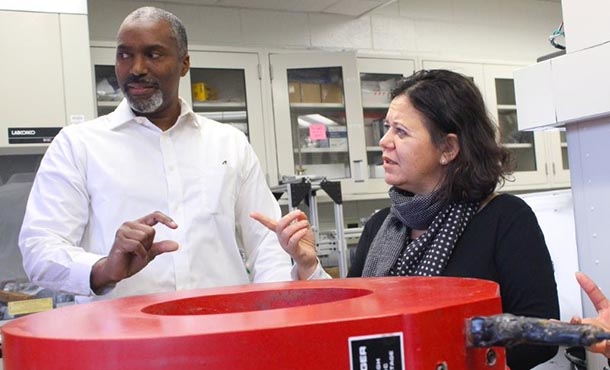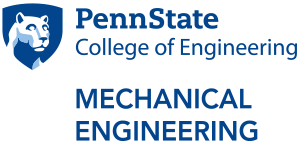
Paris von Lockette, the principal investigator of the grant and associate professor of mechanical engineering, and Zoubeida Ounaies, professor of mechanical engineering, have been awarded a $500,000 grant from the NSF. IMAGE: ERIN CASSIDY HENDRICK
Building the scientific foundation for a universal 3D printer
Mechanical engineering professors awarded $500,000 from the National Science Foundation to contribute new knowledge to the processing of polymer matrix composites
11/11/2019
By Erin Cassidy Hendrick
UNIVERSITY PARK, Pa. — The National Science Foundation recently awarded researchers in the Penn State Department of Mechanical Engineering (ME) a $500,000 grant to develop the science underlying a universal 3D printer.
Paris von Lockette, the principal investigator of the grant and associate professor of mechanical engineering, and Zoubeida Ounaies, professor of mechanical engineering, will collaborate in order to contribute new knowledge related to the processing of polymer matrix composites.
“While we aren’t trying to build a 3D printer with this work, we are developing the science that can underly the processing techniques that can be integrated into it. It represents a technological pathway for the field,” von Lockette said.
Ounaies added, “We are showing a path toward making a universal 3D printer possible by looking at the fundamental science.”
The researchers will further explore smart materials and directly apply this knowledge to additive manufacturing, commonly referred to as 3D printing.
“Additive manufacturing is inherently multidisciplinary, so you need to come at it from different areas to advance it,” Ounaies said.
Currently, when multiple materials are used to 3D print pieces, several reservoirs and complex machinery must also be used. This research aims to simplify and streamline the process by drawing the needed materials from a single source and applying transformative properties to the appropriate molecules.
“By applying coupled electromagnetic fields, you can make the material conductive, stiff, compliant, really flexible, insulative, magnetic or nonmagnetic,” von Lockette said. “All this can be done by changing the micro-architectures that form within the material, so you don’t have to switch between different reservoirs.”
Using this method, the researchers intend to develop a process where monolithic parts with locally dichotomous properties can be additively manufactured depending on their intended purpose.
This interdisciplinary project furthers and fuses knowledge in additive manufacturing and smart materials, areas where the ME department has historic and emerging strengths.
“There is a periphery of science that exists around additive manufacturing,” von Lockette said. “This is where mechanical engineering is headed; we are branching out into new areas and that is where the innovations will happen.”


